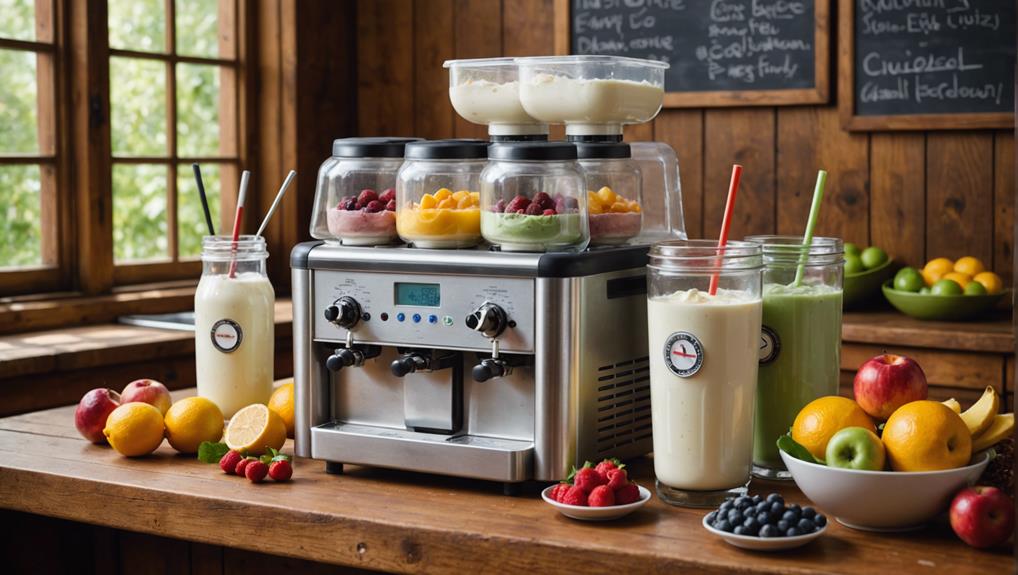Frozen yogurt often includes various sweeteners: natural, artificial, and sugar alcohols. Natural sweeteners like honey, maple syrup, and agave not only add flavor but also provide beneficial nutrients and antioxidants. Sugar alcohols such as erythritol and xylitol offer sweetness with fewer calories, although they should be consumed in moderation. Artificial sweeteners, including aspartame and sucralose, contribute zero calories and aid in blood sugar control, albeit with possible taste sensitivities. Each type of sweetener influences the flavor, texture, and nutritional profile of the yogurt. To make healthier choices, it's crucial to understand these differences.
Key Takeaways
- Natural sweeteners like honey, maple syrup, and agave enhance flavor and provide beneficial nutrients in frozen yogurt.
- Sugar alcohols such as erythritol and xylitol offer low-calorie sweetening options with minimal impact on blood sugar.
- Artificial sweeteners like aspartame and sucralose reduce calorie intake and extend the shelf life of frozen yogurt.
- Different sweeteners influence the taste profile, with honey adding floral sweetness and agave providing milder sweetness.
- Liquid sweeteners like honey and maple syrup improve frozen yogurt texture by inhibiting ice crystal formation.
Natural Sweeteners

Natural sweeteners, such as honey, maple syrup, and agave, offer a healthier alternative to refined sugar in frozen yogurt formulations. These natural sweeteners not only provide sweetness but also contribute beneficial nutrients and antioxidants. Honey, a liquid sweetener, contains enzymes, vitamins, and minerals that can enhance the nutritional profile of frozen yogurt. Similarly, maple syrup is rich in antioxidants and essential minerals like manganese and zinc, while agave provides a lower glycemic index, making it a suitable option for individuals managing blood sugar levels.
Incorporating fruits such as bananas, dates, applesauce, and berries as natural sweeteners can further improve the health benefits of frozen yogurt. These fruits are rich in fiber, vitamins, and phytonutrients, contributing to the overall nutritional value. Additionally, liquid sweeteners like honey and maple syrup have functional properties that can inhibit ice crystal formation, leading to a smoother texture in frozen yogurt.
Experimenting with different natural sweeteners can add unique flavors and textures, offering consumers a diverse and enjoyable sensory experience. By opting for these natural alternatives, manufacturers and home chefs can create frozen yogurt that is not only delicious but also aligned with health-conscious dietary choices.
Sugar Alcohols
While natural sweeteners offer numerous health benefits, sugar alcohols have emerged as another alternative in frozen yogurt formulations, providing a low-calorie option without significantly affecting blood sugar levels. Commonly used sugar alcohols in this scenario include erythritol, xylitol, sorbitol, and maltitol. These low-calorie sweeteners are particularly advantageous for individuals managing diabetes or those seeking to reduce caloric intake.
Sugar alcohols are polyols that provide sweetness similar to that of sugar but with fewer calories. They are not fully absorbed by the body, which mitigates their impact on blood glucose levels. For instance, erythritol contains almost no calories and has minimal effect on blood sugar, making it a preferred choice among health-conscious consumers.
However, it is important to consume sugar alcohols in moderation. High intake of these sweeteners can lead to digestive issues such as bloating and diarrhea due to their incomplete absorption in the intestine.
| Sugar Alcohol | Calories per Gram | Common Use in Frozen Yogurt |
|---|---|---|
| Erythritol | 0.24 | Low-calorie sweetener |
| Xylitol | 2.4 | Sweetness enhancer |
| Sorbitol | 2.6 | Texture improver |
| Maltitol | 2.1 | Sugar substitute |
Artificial Sweeteners

Artificial sweeteners, such as aspartame, sucralose, saccharin, and acesulfame potassium, are widely used in frozen yogurt formulations to provide sweetness without the added calories. These synthetic sugar substitutes are favored for their ability to deliver intense sweetness in minimal quantities, thereby contributing to a lower overall caloric content.
Artificial sweeteners in frozen yogurt offer several benefits, including:
- Reduced calorie intake: By using artificial sweeteners, frozen yogurt can maintain its sweet taste while greatly reducing calorie content compared to sugar-sweetened alternatives.
- Lower fat content: The use of artificial sweeteners often aligns with formulations aiming for a lower fat profile, benefiting those mindful of their fat intake.
- Controlled blood sugar levels: Artificial sweeteners do not spike blood sugar levels, making them a suitable option for individuals managing diabetes.
- Enhanced shelf life: Certain artificial sweeteners can contribute to the preservation of frozen yogurt, extending its shelf life.
When selecting a sweetener of choice for frozen yogurt, it is essential to take into account individual sensitivities, as some consumers may experience a bitter aftertaste or other adverse reactions. Overall, incorporating artificial sweeteners into frozen yogurt provides a viable option for those seeking a healthier dessert alternative. Always refer to the nutritional info and additional information provided on product labels to make informed dietary choices.
Impact on Taste
Selecting different sweeteners for frozen yogurt can profoundly influence its taste profile, offering a range of flavors from delicate floral notes to rich, complex undertones. Honey, for instance, imparts a unique floral sweetness that enhances the overall flavor complexity. Its natural sugars not only sweeten but also add a nuanced depth that can elevate the dessert's appeal. Similarly, maple syrup introduces a rich, robust taste with earthy undertones, making it a favored choice for those seeking an indulgent and aromatic experience.
Agave syrup, on the other hand, provides a milder sweetness compared to traditional sugar. This characteristic allows the natural tanginess of the yogurt to shine through while still delivering a satisfying sweet taste. Stevia drops, a calorie-free alternative, have gained popularity for their ability to sweeten without adding any caloric content. Despite being calorie-free, stevia does not compromise on taste, making it ideal for sugar-free frozen yogurt recipes.
Utilizing these natural sweeteners can enhance the flavor of frozen yogurt, offering a variety of taste experiences. The choice of sweetener ultimately allows for customization, catering to individual preferences and dietary requirements while maintaining a health-conscious approach.
Choosing the Right Sweetener

Understanding the impact of different sweeteners on both taste and texture is pivotal in choosing the right sweetener for frozen yogurt. Various sweeteners not only enhance flavor profiles but also affect the overall structural integrity of the dessert. For instance, liquid sweeteners like honey and maple syrup are known to inhibit the formation of ice crystals, resulting in a smoother texture.
Selecting the appropriate sweetener involves considering several factors:
- Health Benefits: Natural sweeteners such as monk fruit and stevia offer sweetness without impacting blood sugar levels to a notable degree.
- Flavor Enhancement: Ingredients like honey and maple syrup can enrich the taste of frozen yogurt, adding complex, nuanced flavors.
- Textural Improvement: Liquid sweeteners help prevent the formation of large ice crystals, ensuring a creamier consistency.
- Dietary Preferences: Experimenting with various sweeteners allows customization based on individual dietary needs and taste preferences.
The choice of sweetener plays an essential role in crafting a frozen yogurt that is both delicious and health-conscious. Incorporating natural options like monk fruit or honey can achieve a balanced blend of taste and texture. Additionally, understanding the properties of these sweeteners allows for a more informed and tailored approach to frozen yogurt creation.
Frequently Asked Questions
Is There Added Sugar in Frozen Yogurt?
Yes, frozen yogurt often contains added sugar. To manage sugar content, check for natural sweeteners, hidden sugars, and lactose levels. Sugar substitutes like stevia and monk fruit can lower calorie count while providing sweetness.
Does Frozen Yogurt Have Aspartame?
Frozen yogurt may contain aspartame, raising aspartame safety concerns. To avoid potential health effects, check ingredient labels for sweetener alternatives like stevia or monk fruit, which can impact taste while addressing aspartame concerns.
Is There High Fructose Corn Syrup in Frozen Yogurt?
Ironically, despite the health risks associated with high fructose corn syrup, most frozen yogurt brands cater to consumer preferences by opting for natural alternatives. Comparing brands and their production processes reveals nutritional benefits from using cane sugar, honey, or fruit purees.
What Is in Frozen Yogurt Ingredients?
Frozen yogurt ingredients typically include cultured milk, fruit purees, stabilizing agents, natural flavors, and flavor enhancers. Additionally, probiotic cultures such as S. thermophilus and L. acidophilus are incorporated for their health benefits and digestive support.
Conclusion
In the world of frozen yogurt, sweeteners stand as the gatekeepers, each with unique attributes and influences on taste and health. Natural sweeteners evoke the purity of the earth, while sugar alcohols and artificial sweeteners mirror the innovation of human ingenuity. The choice of sweetener serves as the keystone, balancing flavor and health implications. Therefore, selecting the appropriate sweetener is akin to crafting a masterpiece, where each element must harmonize to achieve nutritional and sensory excellence.







